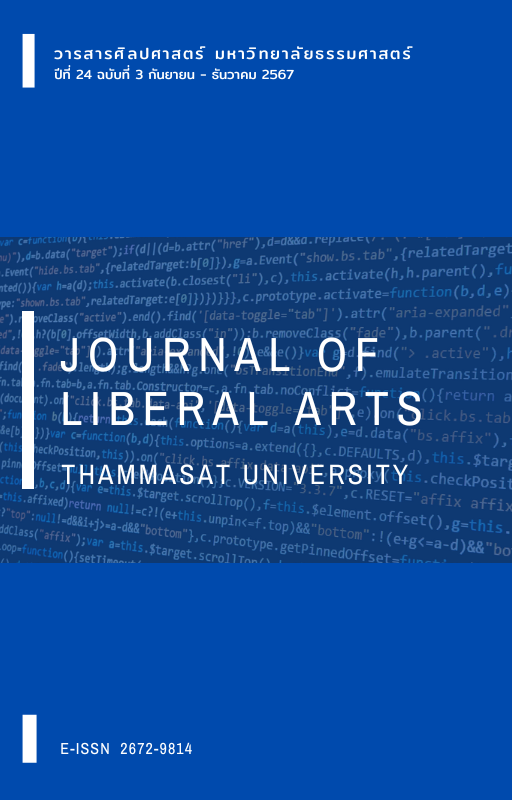The Two-tiered Mind Model as a Theoretical Concept for Developing a Metatheory of the Psyche
Main Article Content
บทคัดย่อ
In the current paper, the author proposes that the human mind can be categorized into two overarching levels–lower and higher levels of mind. At the lower level, the mind tends to have a strong propensity to be trapped in the inferiority-superiority mode of self-perception, as well as having a strong propensity to cling strongly to pleasure or happiness. Within the higher mind level, individuals may be able to transcend these two propensities. This proposed two-level model of the mind, which enjoins core concepts from a vast array of psychological theories, the author suggests, could be used for developing a metatheory of the psyche.
Downloads
Article Details

อนุญาตภายใต้เงื่อนไข Creative Commons Attribution-NonCommercial-NoDerivatives 4.0 International License.
เอกสารอ้างอิง
Adler, A. (1924). The practice and theory of individual psychology (P. Radin, Trans.). Kegan Paul, Trench, Trubner.
Adler, A. (1927). Understanding human nature (W. B. Wolfe, Trans.). Greenberg.
Adler, A. (1938). Social interest: A challenge to mankind (J. Linton, & R. Vaughan, Trans.). Faber and Faber.
Adler, A. (1931). What life should mean to you. Little, Brown, and Company.
Adler, A. (2019). The fundamental views of individual psychology. The Journal of Individual Psychology, 75(3), 185-187. https://dx.doi.org/10.1353/jip.2019.0023
Agrawal, S. (2021, August 18). Higher mind-lower mind. https://www.smritiagrawal.com/higher-mind-lower-mind/
American Psychological Association. (n.d.). Metatheory. In APA dictionary of psychology. Retrieved October 20, 2024, from https://dictionary.apa.org/metatheory
Badcock, P. B. (2012). Evolutionary systems theory: A unifying meta-theory of psychological science. Review of General Psychology, 16, 10-23. https://doi.org/10.1037/a0027917
Berne, E. (1961). Transactional analysis in psychotherapy: The classic handbook to its principles. Condor.
Berne, E. (1964). Games people play: The psychology of human relationships. Grove Press.
Bodhi, B. (2000). The connected discourses of the Buddha. Wisdom.
Bodhi, B. (2009). Majjhima Nikaya: The middle length discourses of the Buddha (B. Bodhi & B. Nanamoli, Trans.). Wisdom Publications.
Bodhi, B. (2012a). Comprehensive manual of abhidhamma: The abhidhammattha sangaha. Pariyatti Publishing.
Bodhi, B. (2012b). The numerical discourses of the Buddha. Wisdom Publications.
Britannica, T. (Ed.). (2024a, August 16). Mind. In Encyclopedia Britannica. Retrieved October 20, 2024, from https://www.britannica.com/topic/mind
Britannica, T. (Ed.). (2024b, November 19). Ego. In Encyclopedia Britannica. Retrieved October 20, 2024, from https://www.britannica.com/topic/ego-philosophy-and-psychology
Bruton, S. V. (2024, May 9). Psychological hedonism. In Encyclopedia Britannica. https://www.britannica.com/topic/psychological-hedonism
Cook, P. F., Schmiege, S. J., Reeder, B., Horton-Deutsch, S., Lowe, N. K., & Meek, P. (2018). Temporal immediacy: A two-system theory of mind for understanding and changing health behaviors. Nursing Research, 67(2), 108-121. https://doi.org/10.1097/NNR.0000000000000265
Cherry, K. (2024, June 10). What are psychological theories? Verywell Mind. https://www.verywellmind.com/what-is-a-theory-2795970
Dervin, B., Foreman-Wernet, L., & Lauterbach, E. (2003). Sense-making methodology reader: Selected writings of Brenda Dervin. Hampton Press.
Feist, J., Feist, G. J., & Roberts, T. (2018). Theories of personality (9th ed.). McGraw-Hill International Editions.
Festinger, L. (1954). A theory of social comparison processes. Human Relations, 7, 117-140. http://dx.doi.org/10.1177/001872675400700202
Freud, S. (1933). New introductory lectures on psycho-analysis (W. J. H. Sprott, Trans.). W. W. Norton & Company.
Freud, S. (1964). The standard edition of the complete psychological works of Sigmund Freud (J. Strachey, Ed.). Macmillan.
Grinde, B. (2002). Happiness in the perspective of evolutionary psychology. Journal of Happiness Studies, 3, 331-354. https://doi.org/10.1023/A:1021894227295
Gosling, J. (1998). Hedonism. In The Routledge Encyclopedia of Philosophy. https://www.rep.routledge.com/articles/thematic/hedonism/v-1
Hagger, M. S., & Hamilton, K. (2020). Changing behavior using integrated theories. In M. S. Hagger, L. D. Cameron, K. Hamilton, N. Hankonen, & T. Lintunen (Eds.), The handbook of behavior change (pp. 208-224). Cambridge University Press.
Hall, C. S., Lindzey, G., & Campbell, J. B. (1998). Theories of personality (4th ed.). John Wiley & Sons.
Harris, R. (2009). ACT made simple: An easy-to-read primer on acceptance and commitment therapy. New Harbinger Publications.
Hayes, S. C. (2004) Acceptance and commitment therapy, relational frame theory, and the third wave of behavioral and cognitive therapies. Behavior Therapy, 35, 639-665. http://dx.doi.org/10.1016/S0005-7894(04)80013-3
Hayes, S. C. (2005). Get out of your mind and into your life: The new acceptance and commitment therapy. New Harbinger Publications.
Hofstede, G., & Bond, M. H. (1984). Hofstede’s culture dimensions: An independent validation using Rokeach's Value Survey. Journal of Cross-Cultural Psychology, 15(4), 417-433.
Hofstede, G. (1984). Cultural dimensions in management and planning. Asia Pacific Journal of Management, 1, 81-99. https://doi.org/10.1007/BF01733682
Integrated models of psychology. (2006, December 22). In Wikipedia. https://psychology.fandom.com/wiki/Integrated_models_of_psychology
Kahneman, D. (2011). Thinking, fast and slow. Farrar, Straus and Giroux.
Kegan, R. (1982). The evolving self: Problem and process in human development. Harvard University Press.
Maurer, M. M. (2024). Suggested metatheory for positive psychology: The organismic systems theory. International Journal of Wellbeing, 14(3), 1-20. https://doi.org/10.5502/ijw.v14i3.2547
Overskeid, G. (2007). Looking for Skinner and finding Freud. American Psychologist, 62(6), 590-595. https://doi.org/10.1037/0003-066X.62.6.590
Schultz, D. P., & Schultz, S. E. (2017). Theories of personality. Cengage Learning.
Scarf, M. (1971, February 28). The man who gave us “inferiority complex,” “compensation,” “overcompensation,” “aggressive drive” and “style of life”. The New York Times. https://www.nytimes.com/1971/02/28/archives/the-man-who-gave-us-inferiority-complex-compensation.html
Skinner, B. F. (1963). Operant behavior. American Psychologist, 18(8), 503-515. https://doi.org/10.1037/h0045185
Toomela, A. (2020). Psychology today: Still in denial, still outdated. Integrative Psychological & Behavioral Science, 54(3), 563-571. https://doi.org/10.1007/s12124-020-09534-3
Uher, J. (2021). Psychology’s status as a science: Peculiarities and intrinsic challenges. Moving beyond its current deadlock towards conceptual integration. Integrative Psychological & Behavioral Science, 55(1), 212–224. https://doi.org/10.1007/s12124-020-09545-0
Vaid, V. (2014). The higher self & lower self. Lulu Press.
Vos, J., & Rossouw, P. J. (2015). Towards a model of integrated practice: A psychodynamic-existential approach. Journal of Psychology in Africa, 25(2), 107-115. https://doi.org/10.1080/14330237.2015.1017043
Wallis, S. E. (2010). Toward a science of metatheory. Integral Review, 6, 73-120.
Walshe, M. (2005). The long discourses of the Buddha: A translation of the digha nikaya. Wisdom Publications.
Winter, D. G. (1996). Personality: Analysis and interpretation of lives. McGraw-Hill.
Yanchar, S. C., & Slife, B. D. (1997). Pursuing unity in a fragmented psychology: problems and prospects. Review of General Psychology, 1(3), 235-255. https://doi.org/10.1037/1089-2680.1.3.235


